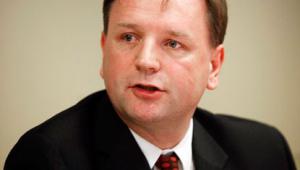11 June 2004
To lose one key policy adviser may be regarded as a misfortune; to lose four looks like either carelessness or preparation for a change in leadership. Either way, a clear-out among Tony Blair's confidantes is taking place at Number 10.
The change of guards is far more deep-seated than simply the replacement of media fixer Alastair Campbell with David Hill. Almost as important is the departure of policy head Geoff Mulgan, after a mere eight months in the job.
The exit stage left of Peter Hyman, Blair's main speech writer, and Paul Kirby, director of reform strategy for the prime minister, are also significant.
There is further speculation that Wendy Thomson, the head of the Office for Public Services Reform, will move on before the next general election. With her track record at the Audit Commission and the London Borough of Newham, it is likely that she would be a prime candidate for a chief executive post at a large local authority.
The government machine is working hard to deny that there is a problem at the heart of its public service reform programme. A Cabinet Office spokeswoman said that the departures of Hyman and Mulgan should not be regarded as significant. 'They all came up for personal reasons,' she said.
Hyman left at the beginning of the year. He moved from being the prime minister's senior strategic communications adviser to the rather less prestigious post of a teaching assistant in an inner-London comprehensive.
Mulgan's jump is arguably of a similar order, to become, from September, director of the Institute of Community Studies a worthy if obscure think-tank in East London. Its halcyon days were a few decades ago when it was founded by Michael Young, the late Lord Young of Dartington, to suggest ways of combating poverty. 'At the very, very, very best, you could see this as a move across,' suggested an experienced Whitehall watcher.
A Mulgan associate suggested another interpretation. 'What would a step forward be?' he asked. After running the prime minister's policy unit, where do you go? Other senior advisers, such as David Miliband and Ed Balls, have chosen the MP route, but that is not in Mulgan's character. Seen from this viewpoint, going back to the rather safe route of leading a policy think-tank, with worldwide lecturing opportunities, is a pleasant break after years of burnout.
Another professional Whitehall observer takes a more jaundiced interpretation. 'It's as if they want to go into religious retreat,' he suggested. 'If you let your imagination run, it's like having been at the dirty end of politics for so long, they want to do something so pure it's like charity work.'
But there are two substantial rumours that might help us understand much better what is happening within Downing Street. Observers inevitably see the personnel changes as established staff getting out before Blair is replaced by Gordon Brown. We are also faced by the fall-out from a rumoured power struggle between Mulgan and Matthew Taylor.
Since last September, Taylor has been in charge of policy planning and helping to draw up the next election manifesto. In the battle of the think-tanks, it has been suggested, Demos in the form of former director Mulgan has lost and the Institute for Public Policy Research as embodied by its former director Taylor has won.
'Taylor is full of ideas, keen on making things more keyed-in,' said the jaundiced Whitehall observer. 'He has a manifesto role and has put Mulgan into the shade. Mulgan's ideas are no longer going anywhere.' Just as significantly, this observer suggested, Taylor is close to Peter Mandelson, whose influence is again in the ascendant.
Rather bizarrely, it is thought that things came to a head over obesity. Mulgan is known to be unhappy at the imposition of a tax on unhealthy foods. The proposal is supposedly favoured by Taylor and has a real chance of being levied if the food industry does not take its own action.
Perhaps if the prime minister did not have his sights so firmly focused on Iraq, this is one conflict that he might have resolved without bloodshed.
PFjun2004



















